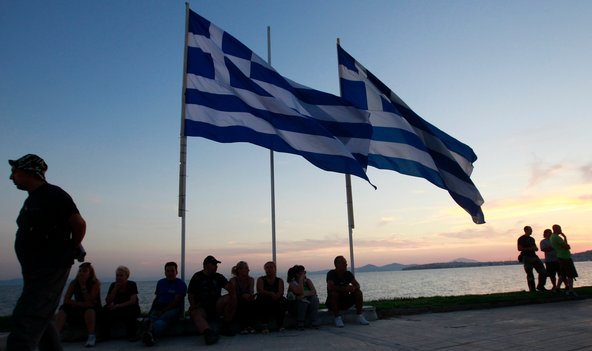One knee-jerk reaction to the shocking Italian election was to worry about the spreading of panic to Spain. As Italian bond yields shot up last Tuesday, Madrid’s were dragged up in sympathy. These are the two troubled big beasts of the euro zone periphery, and an explosion in either of them could destroy the single currency.
But Spain probably will not catch the Italian flu. True, the risk of Madrid’s being thrown off its overhaul path has risen since the inconclusive Italian election. But Prime Minister Mariano Rajoy of Spain does not have to face the voters for nearly three years. What is more, the Italian vote may make euro zone policy makers less eager to embrace austerity and so give Spain a better chance of returning to economic growth.
Investors have already started having second thoughts. By Friday, the yield on 10-year Spanish bonds had fallen back to 5.1 percent from 5.4 percent, where they had been Tuesday. The spread between Spanish and Italian yields has shrunk to 0.3 percentage point. There is even a chance that Madrid could have lower borrowing costs than Rome in coming weeks, if the Italian political paralysis shows no sign of resolution.
There is, of course, no cause for schadenfreude in Madrid. The same factors that led to a stunning breakthrough in the Italian elections for Beppe Grillo, leader of the Five Star Movement protest party, could eventually play out in Spain, albeit in a different way. The traditional Spanish governing parties — Rajoy’s center-right Popular Party and the Socialists — are discredited by a mixture of recession, a 26 percent unemployment rate and allegations of corruption. Each has the support of about 25 percent in opinion polls, while the electorate’s trust in politicians has continued to plummet.
Spain does not have a Mr. Grillo. But it does have radical left and centrist parties, each with about 15 percent support, as well as strong nationalist movements in Catalonia and Basque Country. Unless there is an economic turnaround, nobody will have a majority in the next Parliament and the country could be harder to govern.
The good news is that there is no need for an election until late 2015. What is more, Mr. Rajoy — for all his faults as a poor communicator and slow decision maker — is a dogged reformer. Even the latest corruption allegations do not seem to have diverted him from his path.
It is still too early to talk about economic recovery. The Spanish gross domestic product shrank 1.4 percent last year and the European Commission says it will fall a similar amount this year. But the overhaul efforts are beginning to have an effect. This is most visible in the labor market, where unit labor costs fell another 3.6 percent last year.
Less expensive labor has encouraged car companies to increase production in Spain and offshore call centers to repatriate their operations from places like Latin America and Morocco. The current account deficit, which was 10 percent of gross domestic product in 2008, was virtually wiped out last year.
The overhauling of the banking system is also positive. Mr. Rajoy and his predecessor denied the problems for too long. But busted banks are well on the way to being recapitalized. Dud real estate assets are being shifted into a so-called bad bank. One can quibble about the financial engineering that has been used to keep this bank, a highly leveraged vehicle, off the government’s balance sheet and it may yet return to bite it.
But the economy is no longer plagued by zombie banks diverting their limited funding to zombie property companies. The challenge now is to get credit flowing to healthy parts of the economy.
The government is also pressing ahead with new overhauls. The most important are measures to deter early retirement and make pensions more affordable; the creation of a single market within Spain by getting rid of the barriers between the country’s 17 regions that gum up trade; and a crackdown on duplication between different levels of government.
The country’s Achilles’ heel is the poor state of its public finances. The deficit has fallen, but it was still 6.7 percent of gross domestic product last year. The European Commission says the deficit will be about the same this year before rising to 7.2 percent next year, as the supposedly temporary tax increases wear off. Debt, meanwhile, is forecast to reach 101 percent of gross domestic product by the end of next year.
The government itself is more optimistic than this. Even so, it faces a challenge in reconciling the need to put its finances on a sustainable footing with the need to get its economy growing. This is where the Italian election might help.
Spain’s European partners may be so worried that austerity might fuel populism elsewhere in the euro zone that they may cut Madrid extra slack in achieving its budget targets.
At present, Spain is supposed to cut its deficit below 3 percent of gross domestic product next year. That is impossible. It is hoping to negotiate a deal allowing the deficit to drop to, say, 4.7 percent next year and 3.4 percent the year afterward, with a figure of less than 3 percent being achieved only in 2016.
Even to get to that point, the bulk of the temporary tax increases would have to be made permanent and there would have to be some further belt-tightening. But at least the hope of growth would not be stamped out.
Provided Madrid sticks with its ambitious program of structural overhauls, its partners should agree to such a path. Spain would then see a silver lining to the Italian cloud.
Hugo Dixon is editor at large of Reuters News.
Article source: http://www.nytimes.com/2013/03/04/business/global/04iht-dixon04.html?partner=rss&emc=rss

